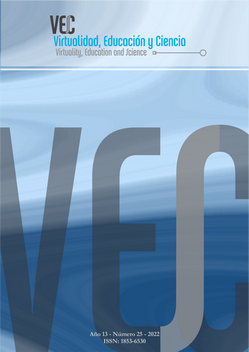Development and validation of a framework for the analysis of virtual collaborative work
DOI:
https://doi.org/10.60020/1853-6530.v13.n25.37693Keywords:
collaboration; constructivism; ICT; regulation; cooperationAbstract
The inclusion of collaborative aspects, mediation by technologies, and distance education has problematized the notion of learning and has led to new questions about how to study this process. Our work develops and validates a frame of reference that collaborates in the analysis of which are the best variables that can intervene in collaborative work through a computer. The field of Computer-Supported Collaborative Learning – CSCL-, has a long controversial history about its theories, methods, and definition. From the theoretical framework, we developed a first version of our framework; then, we submitted it to the analysis of judges to create a second version and apply it to our field of study. We conclude that the dimensions that best make visible the actions that facilitate or hinder collaboration in virtual educational networks are agentivity, metacognitive knowledge, and the learning regulation process.
References
ARROW, H.; POOLE, M. S.; HENRY, K.B.; WHEELAN, S y MORELAND, R. (2004). Time, chanche, and development: the temporal perspective on groups. En: Small Group Research 35, pp 73-105. Doi: 10.1177/1046496403259757.
COLL, C. (2001). Constructivismo y educación: la concepción constructivista de la enseñanza y del aprendizaje. En: Desarrollo psicológico y educación. Psicología de la educación escolar. Madrid: Alianza, pp. 157-188.
DILLENBOURG, P. y JERMANN, P. (2007). Designing integrative scripts. En: Scripting Computer-Supported Collaborative Learning: Cognitive, Computational and Educational Perspectives. pp 275- 301. New York: Springer,
GARRISON, D. R. (2004). Student role adjustment in online communities of inquiry: model and instrument validation. En: Journal for Asynchronous Learning Networks 8, pp. 61–74.
HERNÁNDEZ SAMPIERI, R.; FERNÁNDEZ COLLADO, C. y BAPTISTA LUCIO, P. (2010). Metodología de la Investigación. México: McGraw Hill.
HURME, T.; PALONEN, T. y JÄRVELÄ, S. (2006). Metacognition in joint discussions: an analysis of the patterns of interaction and the metacognitive content on the networked discussions in mathematics. En: Metacognition Learning 1, pp. 181-200.
JÄRVELÄ, S. y HADWIN, A. (2013). New Frontiers: Regulating Learning in CSCL. En: Educational Psychologist 48(1), pp. 25-39.
KIRSCHNER, P.; KREIJNS, K.; PHIELIX, C. y FRANSEN, J. (2015). Awareness of cognitive and social behaviour in a CSCL environment. En: Journal of Computer Assisted Learning 31(1), pp. 59–77.
KOLLAR, I.; FISCHER, F. y HESSE, F. (2006). Collaboration Scripts; A Conceptual Analysis. En: Educational Psychology Review 18(2), pp. 159-185. Berlín: Springer Verlag.
KOSCHMANN, T. (1996). Paradigm shifts and instructional technology. En: CSCL: Theory and practice of an emerging paradigm, pp. 1-23. New Jersey: Lawrence Erlbaum.
MALMBERG, J.; JÄRVELÄ, S.; JÄRVENOJA, H.; PANADERO, E. (2015). Promoting socially shared regulation of learning in CSCL: Progress of socially shared regulation among high- and low-performing groups. En: Computers in Human Behavior 52, pp. 562–572.
MILLER, M. y HADWIN, A. (2012). Social aspects of regulation: Measuring socially-shared regulation in collaborative contexts. Paper presented at the annual meeting of the American Educational Research Association, Vancouver, British Columbia, Canada
REMESAL, A. y COLOMINA, R. (2013). Social presence and online collaborative small group work: a socioconstructivist account. En: Computers & Education 60, pp. 357–367.
ROMERO, M. y LAMBROPOULOS, N. (2011). Internal and External Regulation to Support Knowledge Construction and Convergence in Computer Supported Collaborative Learning (CSCL). En: Electronic Journal of Research in Educational Psychology 9(1), pp. 309-330.
SCHRAW, G. y DENNISON, S. (1994). Assessing metacognitive awareness. En: Contemporary Educational Psychology 19, pp. 460-475.
STAHL, G. (2006). Group cognition: Computer support for building collaborative knowledge. Cambridge: MIT Press.
STAHL, G.; KOSCHMANN, T. y SUTHERS, D. (2006). Computer-supported collaborative learning: An historical perspective. En: Cambridge handbook of the learning sciences, pp. 409-426. Cambridge Cambridge University Press.
SCHUNK, D. H. y ZIMMERMAN, B. (Eds.). (2008): Motivation and self-regulated learning: theory, research, and applications. NewYork: Erlbaum.
VOLET, S.; SUMMERS, M. y THURMAN, J. (2009) High-level co-regulation in collaborative learning: How does it emerge and how is it sustained? En: Learning and Instruction 19, pp. 128-143. Leuven: European Association for Research on Learning and Instruction.
VYGOTSKY, L. (1993). Pensamiento y lenguaje. Buenos Aires: Ediciones Fausto.
WEINBERGER, A. y FISCHER, F. (2006). A framework to analyze argumentative knowledge construction in computer-supported collaborative learning. En: Computers & Education 46, pp. 71–95.
WHITE, C. (1999). The Metacognitive Knowledge of Distance Learners. En: Open Learning: The Journal of Open and Distance Learning
ZIMMERMAN, B. y RISEMBERG, R. (1997). Becoming a Self-Regulated Writer: A Social Cognitive Perspective. En: Contemporary Educational Psychology 22(1), pp. 73-101.
Downloads
Published
Issue
Section
License

This work is licensed under a Creative Commons Attribution-NonCommercial 4.0 International License.
The generation of derivative works is allowed as long as it is not done for commercial purposes. The original work may not be used for commercial purposes.


